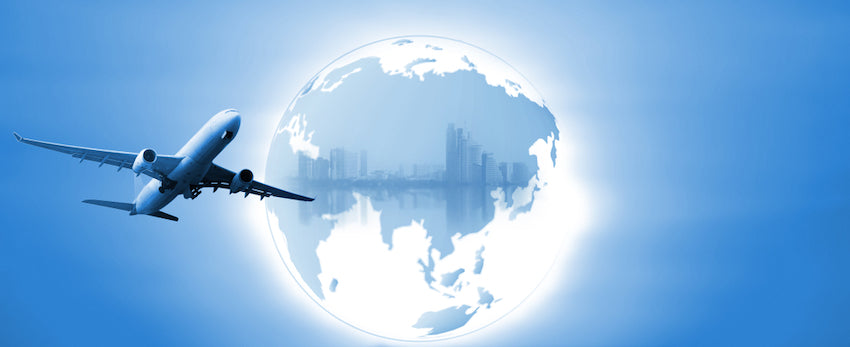
Where CBD Is & Isn’t Legal: France, Italy, Aruba & More
While CBD has become increasingly embraced across the world, not every country has embraced it with open arms like the United States chose to do. What’s more, rules of what’s a permissible percentage of THC and the intended use of the CBD vary from Italy to France to Spain and beyond.
What should be obvious is that the legality of CBD in various nations is a complex topic due to the constantly shifting policies when borders are crossed. In some places, CBD products are completely legal, while in others there are specific restrictions on THC levels. Some countries and nations have completely banned CBD with serious consequences.
Even in nations where CBD use is approved, you need to be careful about the legality of sourcing, THC levels, and crossing borders with the substance. Here is a rundown of the legality of CBD in various nations. Keep in mind that just because CBD is legal somewhere, it doesn’t mean that crossing the border while traveling to or from that country is legal. Check all current laws specific to your travel destination before you head on your way.
Policies for CBD by Country (Updated in November 2023)
Aruba
Although marijuana is illegal in Aruba, CBD with less than 0.2% THC is legal for medicinal use purposes. It is available at pharmacies and can be bought without a prescription. While traveling, you can bring CBD products into Aruba with less than 0.2% THC, but medical cannabis flower is considered illegal.
Bahamas
There are 13 countries in the Caribbean, with the Bahamas being one of them. You might assume that this area has opened its arms up to CBD, but only 5 of the Caribbean islands have legalized CBD use. CBD is illegal in the Bahamas, as well as hemp, THC, and any form of cannabis. If you are looking to enjoy these islands while packing your CBD, try Saint Vincent or the Grenadine Islands instead where CBD is legal.
Barbados
Barbados is nebulous in its treatment of CBD, so it's advisable to examine the country's treatment of other hemp plants.
The utilization of marijuana for medicinal reasons is permitted in Barbados. Therefore, if you plan to travel to Barbados and wish to bring CBD oil, bringing a prescription is highly recommended. This presents a challenge for Americans, as the United States doesn't require a prescription, making it difficult to obtain one no matter the medical need.
Canada
CBD with less than 0.3% THC is legal in Canada. In this nation, CBD is considered a controlled substance under the Cannabis Act. As with many countries, there are specific regulations against traveling with CBD. That being said since CBD is legal in the United States and Canada, you can travel across the North American border with CBD oil in hand.
Cayman Islands
CBD laws are very specific in the Cayman Islands and are only available through a medical doctor's prescription. Keep in mind that you should not bring CBD with you on a trip to the Cayman Islands because it is deemed illegal.
Colombia
In Colombia, CBD products including oil, supplements, tinctures, sprays, capsules, and topical creams are legal. One of the most lax in terms of regulations, Columbia also permits the export of CBD oil to other countries regardless of how much THC it contains.
Egypt
Egypt has a zero-tolerance policy towards cannabis, making CBD illegal there. All cannabis products are prohibited in this nation, including CBD which is classified as a narcotic drug under Egyptian law. Possession and consumption are punishable by imprisonment and fines.
France
With one of the strictest regulations on cannabis in Europe, oddly CBD is legal in France but only with a THC content of less than 0.3%. CBD in France must be classified and sold as a food supplement product, not a medicinal product. The laws become even more confusing in this nation, considering that the sale of hemp flowers and leaves is illegal.
Take note, France's stance toward CBD is in flux, so it's important to seek up-to-date information on its legality. For example, as recent as December 29, 2022, an extremely firm legal ban on all CBD was overturned by the France's Council of State after the government previously prohibited it in 2021.
Germany
In one of the most progressive nations regarding CBD use, Germany has made it legal to buy and use CBD. CBD made from industrial hemp is widely available throughout Germany in a variety of formats. As with most European countries, the THC level must be under 0.2%.
Iceland
CBD products are legal in Iceland, provided they are free of THC. There is one exception to this rule with a cannabis-based medicine that must be legally prescribed by licensed neurologists called Sativex. A medication used for multiple sclerosis and muscle dystrophy, it contains isolated forms of CBD and THC.
Ireland
The CBD regulations in Ireland are a little tricky. Ireland does not recognize any health benefits of CBD; therefore it can’t be sold as a medical product, but only as a food supplement, which is not uncommon in some European countries.
Italy
Italy is one of the more relaxed European nations, allowing for CBD to be bought and sold as long as it contains less than 0.6% THC, which is a relatively high level. Italy also allows for cannabis strains high in CBD and low in THC, called “Cannabis Light” to be sold.
Jamaica
CBD and hemp-derived CBD products are legal in Jamaica, as long as the THC does not exceed 03%. CBD products are usually expensive and difficult to find in Jamacia.
Japan
Wondering if CBD is legal in Japan? Well, it’s a complex answer. CBD is legal only if it is free of THC in Japan and can be found easily in health food stores and other vendors. Keep in mind that any small amount of THC is highly illegal, so it’s important to make sure you are buying CBD from a safe, reputable source.
Mexico
CBD products that are derived from industrial hemp containing less than 1% THC are legal in Mexico. Although CBD is available in Mexico, it is subject to strict guidelines by federal commissions, so it is important to make sure CBD products are approved by the proper guidelines before purchasing.
Portugal
Well known for its policies that have decriminalized drugs, CBD is legal for medicinal purposes in Portugal as long as it has 0.2% or less THC. It can be purchased and consumed with or without a prescription.
Spain
CBD that has been derived from EU-certified hemp is legal in Spain, although it can’t contain more than 0.2% THC. CBD is not currently listed as an approved food product within the European Union. Therefore, it is considered “not fit for human consumption” according to food regulations. CBD oil in Spain is mainly available for medical use.
Sweden
CBD oil extracted from industrial hemp, containing no levels of THC, is legal to buy and use in Sweden. Laws in this nation indicate that CBD must be sold by a licensed vendor.
United Kingdom
CBD is legal in the United Kingdom; however, it cannot contain any trace of THC. The UK includes all of England, Scotland, Wales, and Northern Ireland. Although CBD is considered legal, there are many variants of regulations to be mindful of. For example, CBD cannot legally be sold in the form of hemp flowers. CBD products in the United Kingdom are considered not for medical use, but as a food supplement when ingested or a cosmetic when applied topically.
Concluding Thoughts About Traveling Abroad With CBD
Whether you’re heading to Venice Italy or Spain’s Canary Islands, the legality of traveling with CBD is murky. Whether you are crossing state lines or traveling internationally, it is important to be aware of the laws for the transportation of CBD products, such as oils, gummies, or creams. Check out the following info for insight into the CBD travel world: CBD Travel Guidelines.
Tips for Verifying and Understanding the Laws of Your Travel Destination
- Consider both the credibility and publication date of the site. Keep in mind that an article written two years ago may no longer reflect the current state of laws toward CBD. For example, Italy heavily revised its legal attitude toward CBD in 2019 and has been iffy toward its own interpretation of the regulations. For this reason, up-to-date advise is the best advise.
- Look into whether a doctor’s prescription is necessary. Doctors in the United States don’t prescribe CBD because anyone of an appropriate age can acquire it without the assistance of a medical professional. Unfortunately, this means that bringing your CBD to countries that require a prescription would be unwise (and illegal).
- If CBD can’t have any THC, opt for broad-spectrum CBD. USA-based CBD with trace amounts of THC (known as full-spectrum CBD) may exceed the other countries’ percentage requirements for CBD. For instance, while the USA enables CBD to contain up to 3% of THC, Spain and Germany caps THC at 2% and Sweden allows no THC. On the flip side, CBD can contain up to 6% THC in Italy, further demonstrating the differences between countries. It’s worth noting that none of the THC amounts mentioned above are enough to induce any intoxication.
- Don’t forget to research the rules of any country where you transfer. To play it safe, make sure that the CBD you bring adheres to the rules of anywhere you may have a layover.

By Emily Wegener
With a unique background as an Integrative Nutrition Health Coach, Masters Degree in Teaching and experience in Psychology, Emily spends much of her time researching and trying out new holistic healing modalities.


